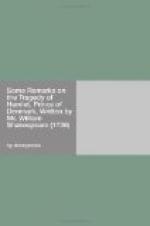Effect that others have, which turn either upon Ambition,
the Love of one’s Country, or Paternal or Filial
Tenderness. Accordingly we find, that few among
the Ancients, and hardly any of our Author’s
Plays, are built upon the Passion of Love in a direct
Manner; by which I mean, that they have not the mutual
Attachment of a Lover and his Mistress for their chief
Basis. Love will always make a great Figure in
Tragedy, if only its chief Branches be made use of;
as for instance, Jealousy (as in Othello) or
the beautiful Distress of Man and Wife (as in Romeo
and Juliet) but never when the whole Play is
founded upon two Lovers desiring to possess each other:
And one of the Reasons for this seems to be, that this
last Species of that Passion is more commonly met
with than the former, and so consequently strikes
us less. Add to this, that there may a Suspicion
arise, that the Passion of Love in a direct Manner
may be more sensual than in those Branches which I
have mention’d; which Suspicion is sufficient
to take from its Dignity, and lessen our Veneration
for it. Of all Shakespeare’s Tragedies,
none can surpass this, as to the noble Passions which
it naturally raises in us. That the Reader may
see what our Poet had to work upon, I shall insert
the Plan of it as abridged from Saxo-Grammaticus’s
Danish History by Mr. Theobalds.
“The Historian calls our Poets Hero Amlethus,
his Father Horwendillus, his Uncle Fengo,
and his Mother Gerutha. The old King in
single Combat, slew Collerus King of Norway;
Fengo makes away with his Brother Horwendillus,
and marries his Widow Gerutha. Amlethus,
to avoid being suspected by his Uncle of Designs,
assumes a Form of utter Madness. A fine Woman
is planted upon him, to try if he would yield to the
Impressions of Love. Fengo contrives, that Amlethus,
in order to sound him, should be closetted by his
Mother. A Man is conceal’d in the Rushes
to overhear their Discourse; whom Amlethus discovers
and kills. When the Queen is frighted at this
Behaviour of his; he tasks her about her criminal
Course of Life, and incestuous Conversation with her
former Husband’s Murtherer; confesses his Madness
is but counterfeited, to protect himself, and secure
his Revenge for his Father; to which he injoins the
Queen’s Silence. Fengo sends Amlethus
to Britain: Two of the King’s Servants
attend him with Letters to the British King,
stricyly pressing the Death of Amlethus, who,
in the Night Time, coming at their Commission, overreads
it, forms a new One, and turns the Destruction designed
towards himself on the Bearers of the Letters. Amlethus
returning Home, by a Wile surprizes and kills his Uncle.”
I shall have Occasion to remark in the Sequel, that
in one Particular he has follow’d the Plan so
closely as to produce an Absurdity in his Plot.
And I must premise also this, that in my Examination




